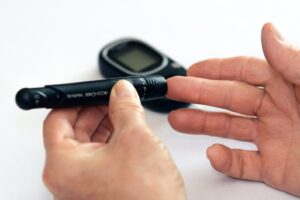 Do you suffer from chronic snoring? Maybe you deal with daytime fatigue? You might have obstructive sleep apnea. Although anyone can develop the breathing disorder, type 2 diabetes can increase your risk. Diabetes and sleep apnea go hand in hand. Studies have found several links between sleep apnea and type 2 diabetes. Here’s what you need to know to control your diabetes while breathing better.
Do you suffer from chronic snoring? Maybe you deal with daytime fatigue? You might have obstructive sleep apnea. Although anyone can develop the breathing disorder, type 2 diabetes can increase your risk. Diabetes and sleep apnea go hand in hand. Studies have found several links between sleep apnea and type 2 diabetes. Here’s what you need to know to control your diabetes while breathing better.
What is Obstructive Sleep Apnea?
Obstructive sleep apnea is a condition that causes frequent breathing disturbances from an obstruction in the upper airway. The tongue and soft tissues in the back of the mouth can collapse when the body relaxes during sleep. This can cause a blockage that can result in hundreds of pauses in breathing during the night, with each event lasting for longer than one minute potentially. Every time your body is depleted of oxygen, it interrupts your sleep cycle. Without sufficient sleep, it can affect your psychological and physical health negatively.
Sleep and Insulin Resistance
Your brain stores memories, your muscles repair, and your heart rate goes down while you’re sleeping. Your blood pressure also decreases, which is important if you have type 2 diabetes. Diabetics are twice as likely to be diagnosed with heart disease, according to the Centers for Disease Control and Prevention (CDC).
Sleeping also allows for hormone regulation, like insulin. Poor sleep quality can contribute to insulin resistance. Your body may struggle to use insulin to move glucose throughout your body. Poor sleep is also linked to a higher body mass index (BMI), which is connected to both diabetes and sleep apnea.
According to the CDC, 25% of middle-aged and older adults with diabetes have a sleep disorder. In addition, 77% of diabetic adults have difficulty sleeping or deal with daytime sleepiness.
With type 2 diabetes, obesity, and sleep apnea connected, maintaining a healthy weight can help improve all conditions. Besides managing your diabetes, regular exercise, and a healthy lifestyle, sleep apnea therapy is equally important.
Options to Treat Sleep Apnea
After confirming a diagnosis, you’ll be referred for sleep apnea therapy. You have multiple options for treatment, including a CPAP machine. Gentle air pressure is delivered through nasal masking to prevent breathing disruptions. It is the most traditional method of treating sleep apnea, but it can be bothersome for some patients.
As an alternative, you may be a candidate for an oral appliance. The custom-fit device moves your tongue and jaw into more comfortable positions to keep the airway open. It is effective in treating mild-to-moderate forms of obstructive sleep apnea.
You can sleep peacefully, knowing you’re improving your general wellness by complying with your treatment plan. You’ll wake up alert and well-rested to feel your best throughout the day.
About Dr. Roger Roybal
Dr. Roybal earned his dental degree from the University of Colorado and has continued his education in sleep medicine. He is a proud member of the American Academy of Dental Sleep Medicine. Request an appointment through his website or call his office at (623) 343-5007.

 Do you suffer from chronic snoring? Maybe you deal with daytime fatigue? You might have obstructive sleep apnea. Although anyone can develop the breathing disorder, type 2 diabetes can increase your risk. Diabetes and sleep apnea go hand in hand. Studies have found several links between
Do you suffer from chronic snoring? Maybe you deal with daytime fatigue? You might have obstructive sleep apnea. Although anyone can develop the breathing disorder, type 2 diabetes can increase your risk. Diabetes and sleep apnea go hand in hand. Studies have found several links between